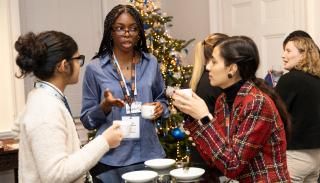Event summary: Navigating fellowships and postdoctoral pathways

Our December workshop ‘Navigating Fellowships and Postdoctoral Pathways’ took placr with the expertise of Dr Stella Morgana (British Academy Postdoctoral Fellow, University of Liverpool) and Dr Amna Kaleem (Leverhulme Early Career Fellow, University of Sheffield). They both shared their experience applying to their respective fellowships, their tips and advice for prospective applicants, and key takeaways for current PhD students who are considering pursuing a postdoctoral pathway.
Dr Kaleem highlighted several issues which prospective applicants must take into consideration when choosing a fellowship programme and institution. Interested applicants should first familiarise themselves with important contacts (beyond their potential mentors) and bureaucratic procedures in their chosen institution. It is possible, for example, that some institutions will not be open to specific fellowships due to financial reasons. Additionally, Dr Kaleem recommended attendees to understand the audience for each fellowship application, as some groups will have non-academic assessors while others will not, and this will impact not only the content but also the structure of successful applications to each programme. Dr Kaleem revealed the importance of understanding expectations with regards to previous research, as some postdoctoral pathways may require almost a ‘clean break’ from your PhD while others may expect a continuation of it.
In preparing a postdoctoral application, Dr Morgana suggested finding the balance between highlighting one’s specificity and originality, while being aware that the panel of assessors may include researchers out of the specific focus area of the proposed project. She revealed the importance of clarity and structure in an application, making sure that the first few sentences correctly situate the audience, that the research questions are clearly laid out, and that every choice is properly justified. Dr Morgana also recommended being specific about what it is that makes your host institution the right ‘academic home’ for your project. In presenting your research plan, she highlights the cruciality of being ambitious but realistic with both your yearly goals and proposed outputs (e.g. providing provisional titles and target journals).
Thank you to all those who joined the event.